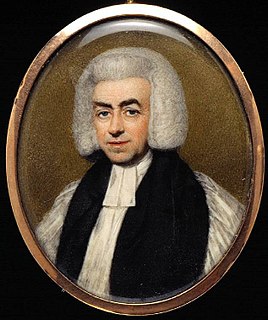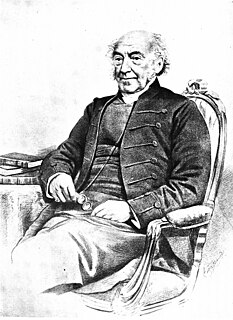Related Research Articles
The Plumian chair of Astronomy and Experimental Philosophy is one of the major professorships in Astronomy at Cambridge University, alongside the Lowndean Professorship. The chair is currently held at the Institute of Astronomy in the University. The Plumian chair was founded in 1704 by Thomas Plume, a member of Christ's and Archdeacon of Rochester, to "erect an Observatory and to maintain a studious and learned Professor of Astronomy and Experimental Philosophy, and to buy him and his successors utensils and instruments quadrants telescopes etc."
Regius Professorship of History is one of the senior chairs in history at the University of Cambridge. It was founded in 1724 by George I as the Regius Professorship of Modern History.
Sir Thomas Adams's Professor of Arabic is a title used at Cambridge University for the holder of a professorship of Arabic; Sir Thomas Adams, 1st Baronet (1586–1668), Lord Mayor of London in 1645, gave to Cambridge University the money needed to create the first Professorship of Arabic.
The Knightbridge Professorship of Philosophy is the senior professorship in philosophy at the University of Cambridge. There have been 22 Knightbridge professors, the incumbent being Rae Langton.
The Norris–Hulse Professorship of Divinity is one of the senior professorships in divinity at the University of Cambridge.
The Slade Professorship of Fine Art is the oldest professorship of art and art history at the universities of Cambridge, Oxford and University College, London.
The White's Chair of Moral Philosophy was endowed in 1621 by Thomas White, Canon of Christ Church as the oldest professorial post in philosophy at the University of Oxford.
The Professorship of Greek is a chair at the University of Glasgow. Following a bequest by Douglas MacDowell, the chair was renamed the MacDowell Professor of Greek in his honour.
The Regius Professor of Medicine is an appointment held at the University of Oxford. The chair was founded by Henry VIII of England by 1546, and until the 20th century the title was Regius Professor of Physic. Henry VIII established five Regius Professorships in the University, the others being the Regius chairs of Divinity, Civil Law, Hebrew and Greek.
The Jesus Chair of Celtic is a professorship in Celtic studies at the University of Oxford within the Faculty of Medieval and Modern Languages. The holder is also a Professorial Fellow of Jesus College, Oxford. Just six people have held the chair since it was established in 1876, the first of whom was Sir John Rhys. The previous post-holder, Thomas Charles-Edwards, retired in 2011. An appeal to ensure the continuation of the chair successfully raised £3.25 million by the end of 2018, and in 2020 the post was taken up by its current incumbent David Willis.
Encyclopaedia Biblica: A Critical Dictionary of the Literary, Political and Religion History, the Archeology, Geography and Natural History of the Bible (1899), edited by Thomas Kelly Cheyne and J. Sutherland Black, is a critical encyclopedia of the Bible. In theology and biblical studies, it is often referenced as Enc. Bib., or as Cheyne and Black.
Leonard Chappelow (1683–1768) was an English clergyman and orientalist. He was Sir Thomas Adams's Professor of Arabic at the University of Cambridge, from 1720, for life, and also Lord Almoner's Professorship of Arabic.

Samuel Hallifax or Halifax (1733–1790) was an English churchman and academic, holder of several chairs at Cambridge and was successively Bishop of Gloucester (1781–1789) and Bishop of St Asaph (1789–1790).

The position of Laudian Professor of Arabic, now known as the Abdulaziz Saud AlBabtain Laudian Professor, at the University of Oxford was established in 1636 by William Laud, who at the time was Chancellor of the University of Oxford and Archbishop of Canterbury. The first professor was Edward Pococke, who was working as a chaplain in Aleppo in what is now Syria when Laud asked him to return to Oxford to take up the position. Laud's regulations for the professorship required lectures on Arabic grammar and literature to be delivered weekly during university vacations and Lent. He also provided that the professor's lectures were to be attended by all medical students and Bachelors of Arts at the university, although this seems not to have happened since Pococke had few students, despite the provision for non-attenders to be fined. In 1881, a university statute repealed Laud's regulations and provided that the professor was to lecture in "the Arabic, Syriac, and Chaldee Languages", and attached the professorship to a fellowship at St John's College.
Thomas Hunt FRS was an English academic, who was Laudian Professor of Arabic at the University of Oxford from 1738 until his death.
Anthony Ashley Bevan, FBA (1859–1933) was a British orientalist.
Julia Margaret Bray is a British scholar of Oriental studies who specialises in Medieval to Early Modern Arabic literature. Since 2012, she has been the Laudian Professor of Arabic at the University of Oxford and a Fellow of St John's College, Oxford. She previously taught Arabic and Arabic literature at the universities of Manchester, Edinburgh and St Andrews, and was Professeur de littérature arabe médiévale at the Paris 8 University from 2003 to 2012.
Emma Frances Bevan (1827–1909) was a British translator and poet.

Thomas Robinson was an English churchman and academic. He became Archdeacon of Madras in 1826, Lord Almoner's Professor of Arabic at Cambridge in 1837, and Master of the Temple in 1845.
The Professorships of Engineering are several established and personal professorships at the University of Cambridge.
References
- 1 2 Sutherland, Lucy (1984). Politics & Finance in the Eighteenth Century . p. 519. ISBN 9780907628460.
- ↑ The Manchester Guardian , 12 December 1933, p. 9.